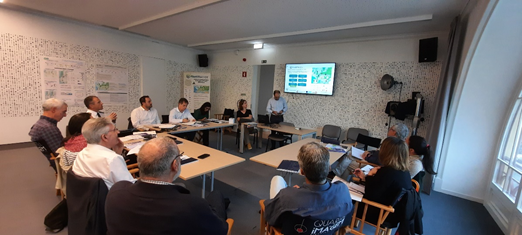The second Regional Stakeholder Committee (RSC) meeting in Portugal for the PilotSTRATEGY project took place in Figueira da Foz on the 17th October 2023.
Representatives from industry, public administration, business, environmental NGOs and civil society engaged in discussion with PilotSTRATEGY researchers about the Carbon Capture and Storage (CCS) offshore pilot near the coastal city. The aim of the event was to understand their various perspectives, expectations and concerns in order to develop a realistic proposal for CCS deployment in the region.
Nineteen representatives from 12 organizations participated in the hybrid format meeting. The diverse group included 8 national and 11 local stakeholders from the public, private and third sectors.
Júlio Carneiro, coordinator of the Portuguese team on PilotSTRATEGY, provided an update on the project’s technical developments. In his presentation he explained the geological suitability of the selected offshore area at Figueira da Foz to safely store CO2 and showed an animation of the preliminary model of CO2 plume dispersion in the storage site over time. He outlined some of the challenges posed by offshore storage and how PilotSTRATEGY is addressing them.
When participants were invited to ask questions, they posed many queries regarding leakage risks, monitoring procedures and funding. The researchers addressed them in detail, helping participants develop informed opinions on the use of CCS technology.
Following a brief presentation of survey results on public attitudes towards CCS in the region by Ana Delicado, Senior Research Fellow at Instituto de Ciências Sociais da Universidade de Lisboa, participants were encouraged to discuss ways of engaging citizens effectively. They recommended reaching citizens through intermediate structures within the community, such as associations, businesses, schools and journalists, and hosting face-to-face meetings, supported by various materials like videos, leaflets, models and demonstrations, to ensure an interactive and informative engagement process. They also highlighted the need to provide both technical information about CCS and an assessment of the associated benefits, risks and impact of the technology.
After the meeting, most participants praised the informativeness of the event, the freedom to express opinions and the inclusive moderation. To further strengthen connections with local actors and gather important insights for future CCS developments in the area, a third RSC meeting has been scheduled in the first trimester of 2024.
“It’s good to come out into the field and engage with stakeholders face-to-face,” said Ana Delicado, Senior Research Fellow, Instituto de Ciências Sociais da Universidade de Lisboa.



